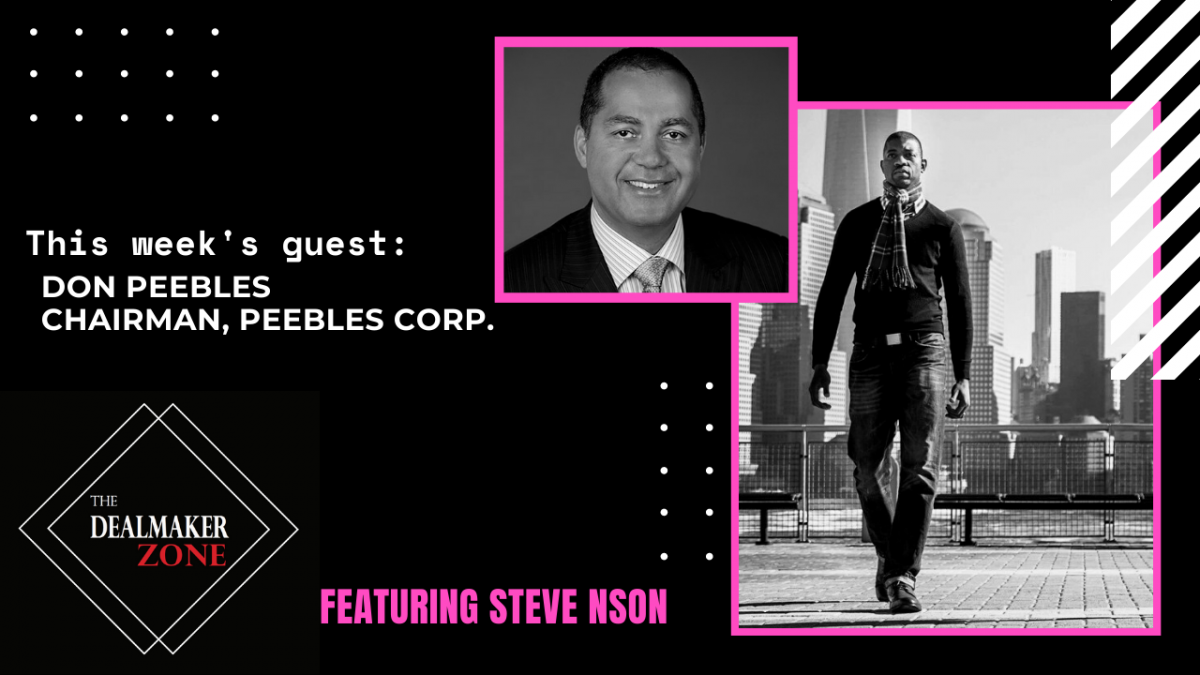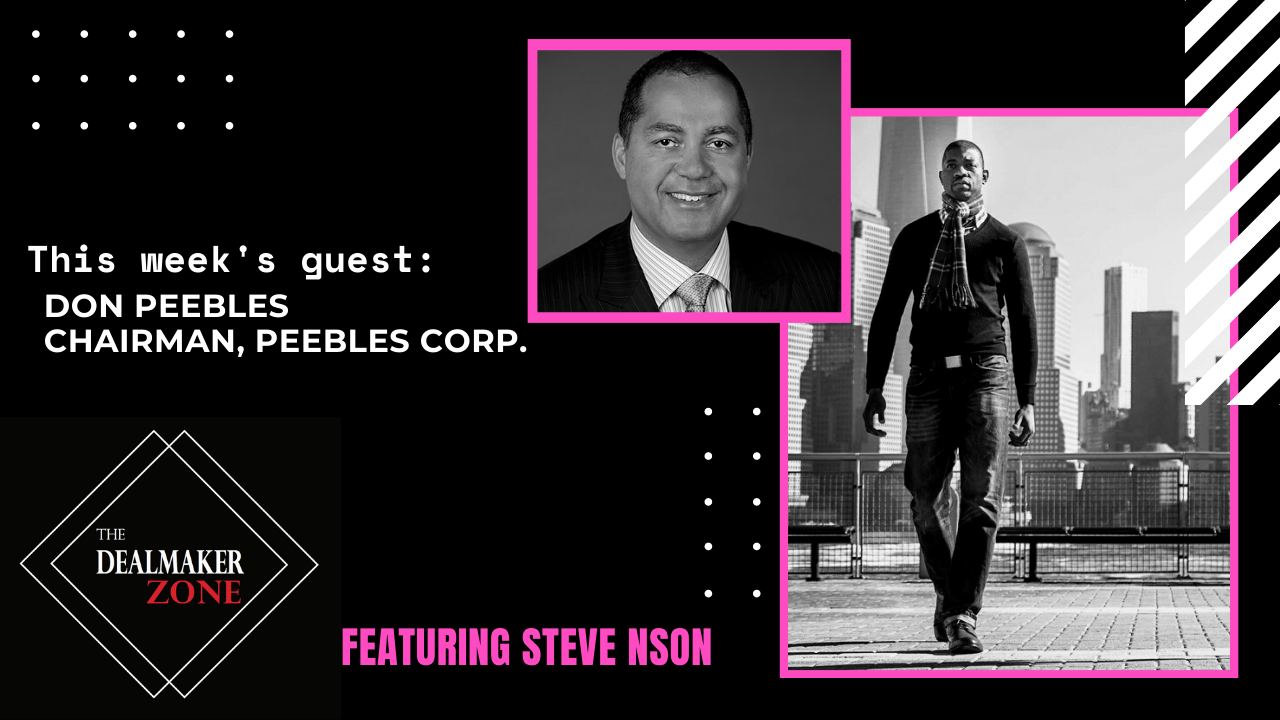The Daily Ten – Don Peebles on The Dealmaker Zone, US Wave of Evictions, Windfall IPO Profits, Tech’s “Texodus”…

The Daily Ten
WATCH
1. This Week on The Dealmaker Zone | Don Peebles – Chairman & CEO, Peebles Corp.
On this week’s episode of The Dealmaker Zone, Steve Nson has a frank and candid conversation with real estate legend Don Peebles on the Presidential election, what President-Elect Biden has to do for the black community, the state of the real estate market and the post- Covid reality for cities like New York and Miami.
2. U.S. Poised for Wave of Evictions in January as Federal Ban Expires | WSJ
Between 2.4 million and 5 million American households are at risk in January alone
More American renters could be evicted from their homes in January than in any month ever, as protections put in place during the Covid-19 pandemic expire unless a last-minute deal is reached to extend them.
That month is when the Centers for Disease Control and Prevention’s ban on evictions is set to expire. The moratorium protects tenants who have missed monthly rent payments from being thrown out of their homes if they declare financial hardship. The CDC ordered the halt on evictions under the Public Health Service Act, which allows the federal government to enact regulations that help stop the spread of infectious diseases.
Between 2.4 million and 5 million American households are at risk of eviction in January alone, and millions more will be vulnerable in the months after, according to estimates from the investment bank and financial-advisory firm Stout Risius Ross.
3. 10 cities where the cost of living has gotten cheaper | CNBC
Since the Covid-19 pandemic hit in March, fluctuations in the economy have impacted cities — for better or worse. While housing prices have increased in suburbs outside major cities like New York City, San Francisco and some parts of Chicago pushing up the cost of living, others places have gotten cheaper.
A recent report from Apartmentguide.com calculated the top 10 metro areas where the cost of living has dropped the most during the pandemic. To conduct the findings, the website looked at cost of living data (including groceries, housing, utility, transportation and healthcare) from The Council for Community and Economic Research from Q1 2020 (Jan. 1 to March 31) and compared it to data from Q3 2020 (July 1 to Sept. 30).
Here are the top cities where the cost of living has gotten cheaper since March, according to Apartmentguide.com’s report.
4. Elon Musk is leaving Silicon Valley for Texas. These millionaires and companies are joining him | CNN Business
New York (CNN Business)Silicon Valley has been the epicenter of the tech industry for decades, starting in 1938 when Bill Hewlett and David Packard started tinkering in a Palo Alto garage.
But that may be changing. Perhaps the most striking evidence of that: A descendant of the company they founded, Hewlett Packard Enterprise (HPE), will move its headquarters to Texas. On Friday, another longtime Silicon Valley stalwart, Oracle (ORCL), announced plans to join them, saying it will relocate its headquarters to Austin.
A string of high profile tech investors and executives are leaving San Francisco, too: Last week, Elon Musk said he has moved to Texas after selling his Bel Air homes earlier this year.
Such moves are to be expected during the pandemic, when people are working from home anyway. Several tech firms have said they’ll give employees the option to permanently work from home even after the pandemic ends.
But the relocation of corporate headquarters, company founders and big-name VC investors points to a corporate diaspora of the tech industry — and what some have called a “tech exodus” from the Bay Area.
5. Sweden’s Covid Workers Are Quitting in Dangerous Numbers | Bloomberg
Sweden faces a shortage of health-care workers as the number of resignations ticks up after a relentless year of caring for Covid patients.
Sineva Ribeiro, the chairwoman of the Swedish Association of Health Professionals, says the situation is “terrible.”
Even before the first wave of the pandemic back in March, there was “a shortage of specialist nurses, including at ICUs,” she said in a phone interview.
The development shows that even countries with universal health-care systems are struggling to keep up with the Covid crisis. This week, Stockholm’s intensive care capacity hit 99%, sending the city into a panic and prompting calls for outside help.
6. The American heartland needs jobs. Could Bitcoin mining become its next savior? | Fortune
A startup called Core Scientific announced this week that it has raised $23 million to expand its cryptocurrency mining operations. The company, based in Bellevue, Wash., is already running crypto mines in North Carolina, Georgia, and Kentucky, and plans to open more before long.
It’s not hard to understand why. Right now, a single Bitcoin—the digital mining equivalent of a gold nugget—is worth around $20,000. Mining a single Bitcoin block brings a reward of 6.25 of them, or about $125,000.
If Core Scientific’s mining ventures are successful, the company will not just make a lot of money. It will also help to repatriate crypto production to the United States, where Bitcoin got its start.
The recent resurgence in crypto mining feels like a good-news story. Mining companies like Core Scientific are in a position to make money and create jobs in rural areas, while also ensuring more Bitcoin—which is becoming a strategic asset—ends up in American hands.
But there are also reasons for caution. The last crypto-mining boom promised similar benefits but resulted in fly-by-night companies leaving a trail of scams and environmental degradation in their wake. Will the outcome be any different this time?
7. Windfall IPO profits exceed dot-com bubble record | Axios
When is making billions of dollars easier than falling off a log? The answer: When giant Wall Street firms like BlackRock and Fidelity get allocated large chunks of stock in white-hot companies. The following day those shares end up being worth vastly more than the investors paid for them.
Why it matters: More money has been made this way in 2020 than in any prior year, even including the height of the dot-com bubble in 2000.
Major companies are postponing their IPOs as a result, worried that they’d effectively be giving billions of dollars away to undeserving investors.
8. Virgin Galactic aborts first powered spaceflight from New Mexico spaceport | The Verge
The vehicle’s engine cut out early, forcing the spaceplane to glide home
This morning, Richard Branson’s space tourism company Virgin Galactic had to abort its first powered test flight of its spaceplane from the company’s home in New Mexico, bringing the vehicle home before it could reach space. During the flight, the spaceplane’s engine cut out too early and the vehicle’s two pilots had to glide back down to the ground early.
The aborted engine ignition was caught live by a Twitch livestream provided by the outlet NASASpaceflight. The video showed the spaceplane, called VSS Unity, dropping away from its carrier aircraft in mid-air as planned. The vehicle then briefly ignited its main engine, according to the video, but the ignition cut out after just a moment. On a typical flight, the spaceplane’s engine will stay ignited for a full minute, propelling the vehicle to the edge of space.
9. Oracle to move HQ out of Silicon Valley, to Texas, citing worker flexibility | C|NET
“This means that many of our employees can choose their office location as well as continue to work from home part time or all the time,” the company says.If you think bankruptcies have been a scourge in the pandemic so far, brace yourself—they’re set to rise dramatically.
Business software and services company Oracle is changing its corporate headquarters from the Silicon Valley area to Austin, Texas, to provide its workers “with more flexibility about where and how they work,” the company said Friday.
“Depending on their role, this means that many of our employees can choose their office location as well as continue to work from home part time or all the time,” Oracle said in a statement. The company opened a large corporate campus in Austin in 2018, but it reportedly doesn’t have any plans to move staff from its existing headquarters in Redwood City, California, to Austin.
10. Why the Office Isn’t Going Away | WSJ
Remote work is getting a lot of love during the pandemic. But there are reasons to believe it won’t stay that way.
The giant work-from-home experiment that no one wanted has been under way long enough to ask: What happens to the office now? Do we really need it?
History reminds us that the early days of the Industrial Revolution began with people doing commercial work from home. Since then, we have been remarkably, some might say stubbornly, committed to the idea that work should be centered at the office, even when it could have been done remotely. We invested huge amounts of money in office real estate equipped to help us be efficient. We also asked employees to spend lots of time and money traveling to those offices.
A lot of people seem to think it’s time to completely overhaul that model. But I’m not convinced that is really what is going to happen.
It is hard to know for certain, but by some counts as much as 40% of the American labor force is working remotely—more people by far than are still at work in offices, given the massive numbers currently unemployed. No one seems to think it is a good idea for college students to keep doing distance learning once the pandemic has receded or to keep having religious services virtually. But a lot of people believe that continuing remote work and at least paring back physical offices is sensible. It seems like only yesterday that the tech companies were the models in doing everything they could to keep employees from leaving their campuses. Now some, like Twitter, are suggesting they never have to come back. Why is that?


